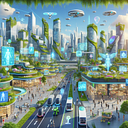The Evolution of Computers
Introduction:
The world has seen an incredible evolution of technology over the years, and no other technology has had such an immense impact as computers. Beginning with primitive counting devices like the abacus, computers have advanced to complex machines capable of performing numerous tasks in a matter of seconds. The evolution of computers has been a fascinating journey, with progress driven by innovative ideas, scientific discoveries, and the need to improve efficiency in multiple fields. This book traces the history and development of computers, taking the reader on a journey through the most transformative periods of a technological revolution that have defined human progress as we know them today.
Chapter 1: The Primitive Era
Civilizations as old as the Babylonians and Egyptians made use of primitive counting devices like the abacus to do calculations. While these machines were not sophisticated, they were essential for trade and commerce. We investigate the early mechanical calculators and the different engines of Charles Babbage.
Chapter 2: The Electronic Era
The first electronic computer (the Colossus) was developed during WWII, with the primary objective of cracking codes, but soon after electronic computers like the Manchester Mark 1 and UNIVAC, became commercially available. We highlight the numerous contributions from geniuses such as John von Neumann and Alan Turing that helped define the modern-day computing field.
Chapter 3: The Personal Computer Era
With the invention of the microprocessor in 1971, there was a rapid proliferation of computers in homes and businesses. The introduction of the PC in the late 1970s and the advent of the internet in the ’90s set the stage for the next phase of computer evolution.
Chapter 4: The Mobile Computing Era
Starting in the 2000s, mobile computing devices began to take over the market, with smartphones and tablets becoming part of our everyday life. We discuss the evolution of portable computing devices, including the advent of wearable computing, such as smartwatches, fitness trackers, and VR headsets.
Chapter 5: The Modern-Day Era and Beyond
Today, computers are no longer just machines that perform calculations, rather, they are cognitive tools that help us make sense of the world around us. We explore how the advancement of artificial intelligence, machine learning, and quantum computing is shaping the next era of computing.
Conclusion:
From counting stones to moving objects to connect the world, computers have come a long way over the past 2000 years. This book provides insight into the development of computers and how it has changed the world from a small community to a universal village. With the current pace of technological innovation, the future of computing is fascinating and limitless. The only thing that we can expect is constant change, redefining the possibilities of computing every single day.
Thank you
